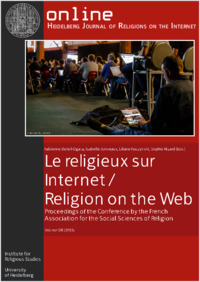Gaia, God, and the Internet - revisited. The History of Evolution and the Utopia of Community in Media Society
- Krüger, Oliver University of Fribourg
-
2015
Published in:
- Online – Heidelberg Journal for Religions on the Internet. - 2015, vol. 8, p. 56-87
English
The question of religious content in the media has occupied many scholars studying the relationship between media and religion. However, the study of recent religious thought offers a promising perspective for the analysis of the cultural perceptions of various media technologies. After the Internet spread in the middle of the 1990s, a variety of religious or spiritual interpretations of the new medium emerged. The far- reaching ideas see the Internet as the first step of the realisation of a divine entity consisting of the collective human mind. In this vision, the emergence of the Internet is considered to be part of a teleological evolutionary model. Essential for the religious and evolutionary construction of the Internet is an incorporation of Pierre Teilhard de Chardin’s model of evolution – especially the idea of the noosphere, and its adoption in media theory by Marshall McLuhan. The connections of these ideas to James Lovelock’s Gaia theory illustrate the notion of the Internet as an organic entity. The article outlines the processes of the reception of religious and evolutionary ideas which led to the recent interpretations of the Internet as a divine sphere.
- Faculty
- Faculté des lettres et des sciences humaines
- Department
- Département des sciences sociales
- Language
-
- English
- Classification
- Religion, theology
- License
-
License undefined
- Identifiers
-
- RERO DOC 306870
- DOI 10.11588/rel.2015.0.20324
- Persistent URL
- https://folia.unifr.ch/unifr/documents/306277
Statistics
Document views: 98
File downloads:
- Document: 119
